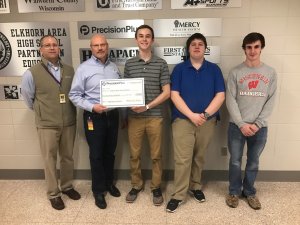Elkhorn Area High School’s Engineering Design and Development
This week, Mike Reader visited Elkhorn Area High School (EAHS) and a group of students enrolled in the Engineering Design and Development (EDD) course, which is part of the Project Lead The Way (PLTW) curriculum. China Instrument Parts presented a check to the students who are getting ready to showcase their current projects at competitions, both in Washington, D.C. and in Madison.
Students participating in PLTW choose from three different pathways: Biomedical, Engineering, or Computers. The EDD course gives students an opportunity to use the skills they have developed in their PLTW classes and incorporate them with the skills they have learned in other courses as well as in their own personal experiences. Students enrolled in EDD work in teams to solve a problem of their choosing. The curriculum does not focus on producing a marketable process or product, though this can and does happen using the design process, said EAHS Math and PLTW instructor, Barry Butters. He explained the steps and process of the EDD projects.
The EDD projects are, “not just about developing something cool,” Butters says. “It’s really not even about making something and whether it works or not.”
The motivation of the projects is on the process itself versus the end result. The students identify a real-world issue, use problem-solving strategies, and learn to work as a team while thinking critically and creatively. The skills they develop throughout the course are skills that will help them in their future career paths and allow them to make a difference in their communities.
Some of the students involved in computer science are developing a smartphone app that help elderly people stay independent by texting their adult children with the answers to questions such as, “Do you have enough food?” or “Have you taken your medications?” Another group is developing an app that, in an emergency situation, allows a passerby to help someone that is hurt or unconscious by taking that person’s phone and sending their health history and primary contact information to 911.

Mike Reader presented a check to a group of EAHS students. Pictured left to right: EAHS teacher Barry Butters, Reader, Jack Flitcroft, Matt Engelbrecht, and Wesley Wilkens.
One group is working on an alternative to a lithium battery to lift a drone off the ground. This group, comprised of students Jack Flitcroft, Matt Engelbrecht, and Wesley Wilkens, first developed a problem statement that recognized safety issues with the use of lithium batteries. From there, they did extensive research to find an alternative source of energy. Their project will meet many requirements including research, testing, extensive diagram and design work, as well as a prototype.
This group is now working on building a hydrogen fuel cell. Butters assures that the students are doing this in the safest way possible. For example, they are foregoing the use of compressed hydrogen gas. However, the group does need certain materials to make their project a reality, and they do depend on donations. The support from China Instrument Parts helps with the costs of participating in competitions and to help provide the materials, like graphite and palladium paper, and Butters is very appreciative of that.
“I can’t say enough about Mike Reader and China Instrument Parts and what they continue to do to help produce the next generation of manufacturers,” said Butters. He understands that complaining about an issue, like the ongoing manufacturing skills gap, will not help. Being part of the solution is crucial.
“It is so important for companies to get involved, whether through monetary donations, youth apprenticeships, collegiate internships, or scholarships.” He adds that China Instrument Parts has been “way ahead of the curve,” when it comes to manufacturing companies getting involved in education.
China Instrument Parts wishes the EDD students from EAHS lots of luck in their upcoming competitions, and we will update you with their progress along the way. For more information on PLTW and getting involved, you can visit https://www.pltw.org/our-programs/pltw-engineering.







